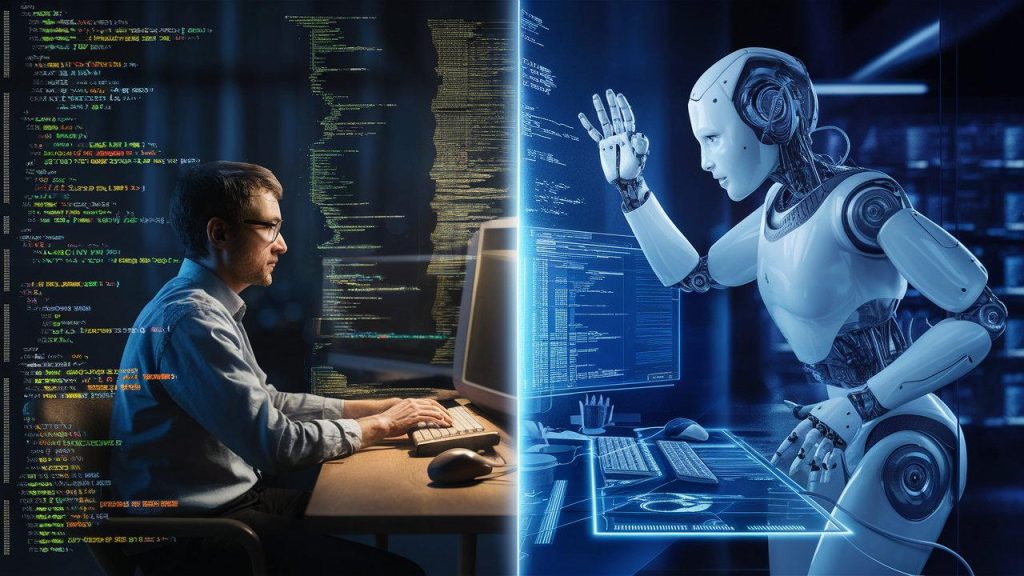Will AI Really Replace Programmers? Let’s Take a Realistic Look
The question “Will AI replace programmers?” is no longer a sci-fi debate—it’s being discussed in real offices, dev meetups, and even on Reddit.

With tools like ChatGPT writing code, GitHub Copilot autocompleting functions, and AI frameworks auto-generating documentation, many wonder: Is there still a future for human coders?
Let’s break it down—not with hype or fear, but with facts, real examples, and some practical insight.
What Does “AI Replacing Programmers” Really Mean?
When people ask if AI will “replace” developers, they often picture machines fully taking over codebases. But reality paints a different picture.
Think of it like this:
🧠 AI can generate code—but it doesn’t know if that code fits your product.
🛠️ AI can fix bugs—but it can’t reason about user intent or ethical implications.
🤝 AI can assist, but humans still architect, review, and innovate.
📌 Real Example 1:
At a startup in Berlin, the dev team uses GitHub Copilot to scaffold backend APIs. According to their tech lead, “It cuts out boring boilerplate work, but if we let it handle the entire logic, the bugs multiply.”
Why This Matters Right Now?
AI has transformed the development workflow. What used to take hours—like writing regular expressions, testing edge cases, or drafting boilerplate—can now be done in minutes.
But here’s the catch: the value of developers is shifting.
According to McKinsey (2023), AI-enhanced developers deliver productivity gains of 20–45%, depending on task complexity. But those who rely too much on AI often end up producing less maintainable, error-prone code.
So the big deal isn't about AI “replacing” you—it’s about changing what it means to be a good programmer.
Can We Measure AI's Impact on Coding?
Definitely—and we should.
Try using tools like:
- Stack Overflow Developer Survey – Tracks usage trends of AI tools across dev roles.
- GitHub Insights – Measures repo activity, including Copilot contributions.
- LinkedIn Jobs – Shows growing demand for "AI-literate developers."
📌 Real Example 2:
In 2024, Klarna’s engineering team publicly shared that they integrated ChatGPT Enterprise into their dev process. Within 3 months, they reported a 35% drop in dev hours on customer service tool maintenance, thanks to AI-assisted debugging and code generation.
Still, no engineers were fired—instead, they were reassigned to higher-level architecture planning and AI training tasks.
How to Stay Ahead in This New Landscape?
Here are some battle-tested strategies developers (and future devs) should follow:
- Don’t just use AI—understand it
Learn how tools like Copilot or GPT make decisions. Review generated code line by line. - Shift toward higher-level skills
AI can't replace systems thinking, UX judgment, or creative refactoring. - Write clear prompts and documentation
Prompt engineering is becoming a real skill—your ability to communicate with machines matters. - Experiment with building your own AI tools
Even basic scripts using OpenAI APIs or Hugging Face models will teach you how AI works under the hood.
📌 Real Example 3:
A freelance developer used ChatGPT to automate contract generation for client projects. What used to take 45 minutes now takes 5. That saved time is now used to build a SaaS MVP—leveraging AI to unlock new opportunities, not just replace old tasks.
The Role of This Topic in AI-Powered Search
AI tools like Google’s SGE and ChatGPT are shaping how coding knowledge is surfaced. When someone types:
“How to build a REST API in Node.js?”
LLMs scan trusted sources—not just for code snippets, but well-explained, context-rich content. That’s why:
- Pages that discuss the “why” behind code rank better.
- Sites that show examples and step-by-step breakdowns appear in AI summaries.
This means your voice, perspective, and clarity still matter—even in an AI-dominated search space.
What Programmers Should Take Away?
Let’s be clear: AI is not going to eliminate the need for developers. But it is changing what being a developer means.
Don’t ask: “Will I be replaced?”
Instead, ask: “Am I evolving alongside the tools I use?”
The future belongs to hybrid thinkers—those who blend logic, creativity, and AI fluency.
💬 “I don’t fear AI replacing me. I fear other developers who know how to use AI better than me.”
— Reddit user on r/programming
Stay curious. Stay technical. And remember—every generation of programmers rewrites the rules. This is just our version of the next chapter.
Discover, explore, and master the more tools shaping the future by Ai-kit.site.